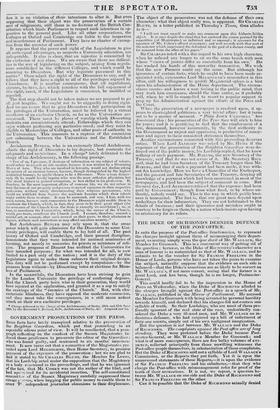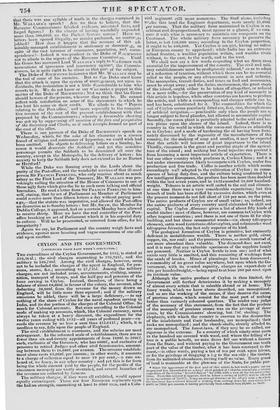TIIE DUKE OF RICHMOND'S DERNIER DEFENCE OF THE POST-OFFICE.
IT suits the purpose of the Post-office functionaries, to represent the charges brought against them of mismanaging their department, as resting simply upon the ipse disit of Mr. WALLACE. the Member for Greenock. This is a convenient way of getting rid of the question ; because, as the Duke of RICHMOND'S character as a man of honour is as untarnished as that of Mr. WALLACE, and he submits to be the voucher for Sir FRANCIS FREELING in the House of Lords, persons who have not taken the pains to examine the subject, naturally suppose that the evidence on each side is balanced—that the Duke's assertions are as likely to be correct as Mr. WALLACE'S, if not more correct, seeing that the former is a great Lord, and has been, though he is no longer, PostmasterGeneral.
This could hardly fail to be the impression in the House of Peers on Wednesday, when the Duke of RICHMOND alluded to the charges brought against the Post-office in a speech of Mr. WALLACE, published in the Mirror if Parliament. He accused the Member for Greenock with being actuated by personal hostility towards himself, and declared that his charges did not contain one 'syllable of truth. So their Lordships, who are most of them profoundly ignorant of the real state of the case, undoubtedly considered the Duke a very ill-used man, and Mr. WALLACE an industrious defamer, who had conjured up a bill of indictment of forty-one counts, simply out of Isis own malignant imagination. But the question is not between Mr. WALLACE and the Duke of RICHMOND. The complaints against the Post-offiee are of long standing. They were preferred before the Duke became Postmaster-General, or Mr. WALLACE Member for Greenock; and what is of more consequence, there are five bulky volumes of EVIDENCE, collected principally from those unwilling witnesses the Post-office people themselves, in substantiation of those complaints. But the Duke of RICHMOND said not a syllable of Lord W sLeAca's Commission, or the Reports they put forth. Yet it is upon the unanswered statements of those Reports,—it is upon the evidence of Sir FRANCIS FREELI NG and his subalterns,—that they who charge the Post-office with mismanagement refer for proof of the truth of their accusations. It is not, we repeat, a question between Mr. WALLACE on one side and the Duke of RICHMOND and Sir FRANCIS FREELI NG on the other.
Can it be possible that the Duke of' RICHMOND actually denied that there was one syllable of truth in the charges contained in Mr. WALLACE'S speech ? Are we then to believe, that the
Revenue Commissioners falsified evidence, misstated facts, and forged figures ? Is the charge of having wastefully expended more than 300,000/. on the Packet Service untrue ? Have no
letters been opened illegally, no monies purloined, no contra',s jobbed? How does it happen that the revenue of this ad_ rnirably-managed establishment is stationary or .tlecreasir,g, in
spite of the vast increase of commerce, population, an corre
spondence ?— Indeed it was prudent in the Duke of .11,ictiNt0Nn not to allude to the reports of the Revenue Commtsst.on. Until his Grace has answered Lord WALLACE'S reply to ly,s former rash accusations of ignorance and inaccuracy against. the Commissioners, he is quite right to be silent on that part of the subject. The Duke of RICHMOND insinuates that Mr. WALLACE may be the tool of some of his enemies. But as t'ae Duke must know
that the attack is upon the system of manr.gement, not upon in dividuals, the insinuation is not a little d',screditable to him who resorts to it. We do not know or say Woo make a puppet in this
matter of the Duke of RICHMOND; br,t we think that his Grace
should beware of the persons, whoever they may be. He cannot reflect with satisfaction on some of the statements to which he has lent his name on their credit. We allude to the " Papers relating to the Post-office," and 'snore especially to the comparative account et' the cost of the present establishment with that
proposed by the Commissioners ; wherein a favourable showing was got up by sumrossing all mention of the fees and perquisites of the Secretary and Clerks, as if such receipts formed no part of the cost of the office.
There is one passage of the Duke of RICHMOND'S speech on Wednesday, which, for the sake of his character as a sincere
friend of religion and contemner of hypocrisy, we could wish had
been omitted. He objects to delivering letters on a Sunday, because it would desecrate the Sabbath ; and yet this sensitive
personage permits the Sabbath to be desecrated all over the country, except in the Metropolis, by the delivery of letters : his anxiety to keep the Sabbath holy does not extend as far as Barnet or Hertford!
While the Duke was flaming away in the Lords about the purity of the Post-office, and the wonderful services of that ill-used
person Sir FRANCIS FREELING, who only receives about as much salary as the First Lord of the Treasury, Mr. WALLACE was provokingly calling the attention of the House of Commons to one of
those ugly facts which give the lie to such mere talking and official
bravadoes. He read a letter from Sir FRANCIS FREELING to himself, stating, that by act of Parliament no Member of Parliament could receive more than fifteen letters a day without paying postge,----that the statute was imperative, and allowed the Post-office no discretion as to Sunday letters : but Mr. SHAW, the Member for Dublin College, it appeared, had on a certain Monday been allowed to receive thirty. Here we have the real controller of the Postoffice breaking an act of Parliament which it is his especial duty to enforce. Will be be prosecuted, or removed from office, for his irregularity ?
Again we say, let Parliament and the country weigh facts and evidence, against mere boasting and vague encomiums of one official upon another.





















 Previous page
Previous page